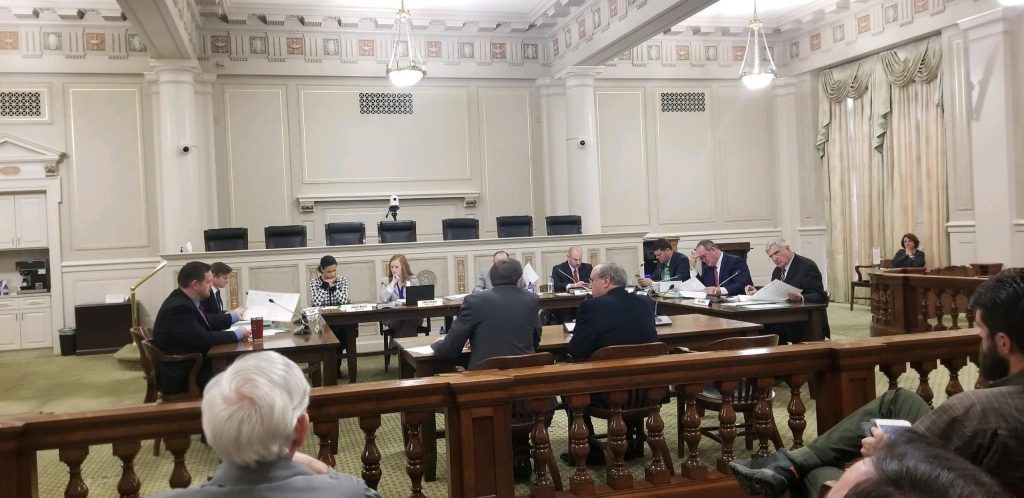A lot is happening at the Arkansas Legislature. Here’s a quick look at some of the bills that have been filed and passed so far.
GOOD BILLS PASSED
S.B. 149 (Abortion): This good bill by Sen. Jason Rapert (R – Conway) prohibits abortion in Arkansas if Roe v. Wade is ever overturned. This good bill has been signed into law. Read The Bill Here.
S.B. 156 (Free Speech): This good bill by Sen. Bob Ballinger (R – Berryville) and Rep. Dan Sullivan (R – Jonesboro) prevents public colleges and universities from infringing the free speech of students and faculty on campus. This good bill has been signed into law. Read The Bill Here.
S.B. 168 (Pro-Life): This good bill by Sen. Cecile Bledsoe (R – Rogers) updates Arkansas’ Safe Haven Act. It lets a woman surrender her newborn to law enforcement personnel, fire department personnel, or medical personnel. Arkansas’ Safe Haven Act protects children from being abandoned, and it provides women with options besides abortion. This good bill has been signed into law. Read The Bill Here.
BAD BILLS FILED
H.B. 1536 (Physician-Assisted Suicide): This bill by Rep. Dan Douglas (R – Bentonville) lets doctors prescribe lethal drugs to terminally ill patients who want to end their lives. In 1999 we worked hard to pass one of the best laws against physician-assisted suicide in the nation. This bad bill upends that good law. We know from experience in other states that people who inquire about assisted suicide generally are not concerned about pain or suffering. Many of them are lonely and feel like they are losing control over their lives because of their illness. They need counseling — not a prescription for lethal drugs. In other states, a lack of oversight has made it possible for patients who request suicide drugs to be euthanized. H.B. 1536 does not contain adequate safeguards to keep that from happening in Arkansas. Under H.B. 1536, Christian hospitals, hospices, and healthcare facilities would not be able to stop doctors who work for them from prescribing suicide drugs to their patients. The bill is currently in the House Public Health Committee. Read The Bill Here.
H.B. 1164 and H.B. 1290: These two bills by Rep. Aaron Pilkington (R – Clarksville) let pharmacists dispense oral contraceptives to women without a prescription from a doctor. Oral contraceptives carry a number of health risks — which is why women currently need a prescription from a doctor — and they can cause the death of an unborn child by preventing the unborn child from implanting and growing inside the mother’s womb. That’s why Family Council opposes both of these bills. These bills are currently in the House Public Health Committee.
Read H.B. 1164 Here.
Read H.B. 1290 Here.
H.B. 1150: This bill expands the list of “qualifying conditions” in Arkansas’ marijuana amendment, making it even easier for people to use so-called “medical” marijuana. Marijuana is a blight on our communities, and Arkansas’ marijuana amendment already is too vague and open-ended. Marijuana needs to be restricted — not expanded. Read The Bill Here.
GOOD BILLS FILED
H.B. 1511 (Home Schooling): This good bill by Rep. Mark Lowery (R – Maumelle) ensures home schooled students and private school students can access the Succeed Scholarship the state offers to students with special needs. Currently, this scholarship is only available for students enrolled in a public school. Read The Bill Here.
H.B. 1413 (Home Schooling): This good bill by Rep. Mark Lowery (R – Maumelle) prevents schools from charging home schooled students extra to take concurrent credit courses for college credit. The bill has passed the House Education Committee, and is currently before the entire House of Representatives. Read The Bill Here.
S.B. 387 (Lottery): This good bill by Sen. Joyce Elliott (D – Little Rock) and Rep. Jasen Kelly (R – Benton) raises the percentage of Arkansas Lottery revenue allocated for college scholarships to 25% by the year 2025. Currently, the Arkansas Lottery spends about 18% of the money it makes on scholarships. Read The Bill Here.
H.B. 1378 (Lottery): This good bill by Rep. Jim Dotson (R – Bentonville) and Sen. Bob Ballinger (R – Berryville) raises the percentage of Arkansas Lottery revenue allocated for college scholarships to 25% by the year 2025. Currently, the Arkansas Lottery spends about 18% of the money it makes on scholarships. Read The Bill Here.
H.B. 1399 (Pro-Life): This good bill by Rep. Karilyn Brown (R – Sherwood) and Sen. Scott Flippo (R – Bull Shoals) prohibits public funds from being used to clone or kill unborn children for scientific research. The bill has passed the Arkansas House, and has gone to the Senate Public Health Committee. Read The Bill Here.
H.B. 1439 (Abortion): This good bill by Rep. Robin Lundstrum (R – Elm Springs) and Sen. Jason Rapert (R – Conway) prohibits abortion in Arkansas after the eighteenth week of pregnancy unless the mother’s life or physical health is in serious jeopardy. The bill has passed the Arkansas House Public Health Committee and will go before the entire Arkansas House of Representatives for a vote sometime next week. Read the Bill Here.
H.B. 1453 (Abortion): This good bill by Rep. Clint Penzo (R – Springdale) and Sen. Kim Hammer (R – Benton) requires abortionists to give women information about perinatal hospice. Modern medicine has made it possible to test unborn children for deadly fetal abnormalities, and many children who test positive for these abnormalities are aborted. H.B. 1453 will help women choose options besides abortion in these situations. The bill is currently in the House Public Health Committee. Read The Bill Here.
S.B. 278 (Abortion): This good bill by Sen. Gary Stubblefield (R – Branch) and Rep. Spencer Hawks (R – Conway) contains several regulations and requirements for abortion clinics, and it makes some improvements to Arkansas’ informed-consent law for abortion and Arkansas’ law protecting babies who survive an abortion. The bill is currently in the Senate Public Health Committee. Read The Bill Here.
H.B. 1289 (Conscience): This good bill by Rep. Brandt Smith (R – Jonesboro) protects the rights of conscience of all healthcare workers and companies. This will prevent people and organizations from being forced to promote, participate in, or pay for medical procedures that violate their conscience — like abortion. The bill is currently in the House Public Health Committee. Read The Bill Here.
S.B. 2 (Abortion): This good bill by Sen. Trent Garner (R – El Dorado) prohibits abortions performed because the baby has Down Syndrome. The bill is currently in the Senate Public Health Committee. Read The Bill Here.
S.B. 3 (Abortion): This good bill by Sen. Trent Garner (R – El Dorado) requires abortionist to report complications arising from an abortion. Abortion carries a number of risks and consequences, and the reporting required by this bill will help Arkansas craft better pro-life laws in the future. The bill is currently in the Senate Public Health Committee. Read The Bill Here.
HOW TO CONTACT YOUR LEGISLATORS
You can leave a message about legislation for your state senator by calling the Arkansas Senate during normal business hours at (501) 682-2902.
You can leave a message about legislation for your state representative by calling the Arkansas House during normal business hours at (501) 682-6211.
READ MORE





